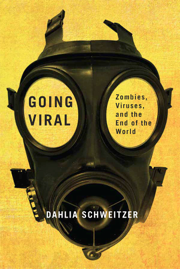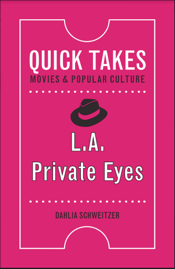
About Dahlia
DAHLIA SCHWEITZER is a pop culture critic, writer, and professor. Described by Vogue as “sexy, rebellious, and cool,” Schweitzer writes about film, television, music, gender, identity, and everything in between. She studied at Wesleyan University, lived and worked in New York City and Berlin, and completed her MA and PhD at the Art Center College of Design and UCLA. She is currently chair of the Film and Media department at the Fashion Institute of Technology in New York City.
In addition to her books, Dahlia has essays in publications including Cinema Journal, Journal of Popular Film and Television, Hyperallergic, Jump Cut, Quarterly Review of Film and Video, and The Journal of Popular Culture. She has also released several albums of electronic music, including Plastique and Original Pickup.

Professor
As a professor of film and media studies, Dahlia exposes her students to a variety of theoretical approaches and cinematic techniques, asking them to approach both with analytical inquisitiveness. Her aim is to pass her own curiosity on to her students, encouraging them to think across their classes and experiences to create intellectual connections between course materials and the world in which they live. She strives to remind her students that the loudest voice is not necessarily correct, and in so doing, helps them find their own.

Media Critic
Declared “one of the world’s leading analysts of popular culture” by renowned author Toby Miller, Dahlia writes about film, television, music, gender, identity, and everything in between. Her work can be found across mainstream, academic, and emergent channels in both long and short form. Repeatedly drawn to popular culture, Dahlia loves to analyze and unpack cultural artifacts in order to explore how they reflect social and historical issues, as well as looking at how they reinforce or interrogate common cultural assumptions.

Author
Dahlia has written numerous books exploring aspects of film and television. Regardless of the topic—serial killers, private detectives, or even zombies—all of her writing engages directly with questions of self versus other, private versus public space, examining depictions of gender, identity, and race. She traces how these depictions evolve and examines what they mean about our changing world. In her latest project, Dahlia explores the ways haunted homes have become a venue for dramatizing anxieties about family, gender, race, and economic collapse.
Blog
Book Launch: “Haunted Homes” / Friday June 18th, 7PM EST
Haunted Homes: Book LaunchDahlia Schweitzer, in conversation with bestselling author and journalist Jonathan Allen, will discuss her latest book, Haunted Homes this Friday, June 18th, at 7PM EST. The event will take place online via Zoom and free tickets can be reserved below or on Eventbrite. About the book: Haunted Homes is a short but groundbreaking study of homes in horror film and television. While haunted houses can be fun and thrilling, Hollywood horror tends to focus on haunted...
Haunted Homes [excerpt]
The following is an excerpt from my forthcoming book Haunted Homes, out June 2021 via Rutgers University Press. “Even serial killers live next door to somebody.”—Summer of 84 Haunted houses feel as much a part of Halloween as pumpkins and costumes. It can be hard to remember where you first saw a haunted house or how old you were the first time you went inside one. They are ubiquitous and generic, commercialized, commodified, and caricatured. Because of their ability to scale up the horror...
Construction Workers Are Not Disposable
In case you haven't been paying attention to the news these last few weeks, things are pretty fucked up. Not only has the corona death toll surpassed Vietnam numbers, but countless states are already planning their re-opening strategies, all while testing and vaccines (and even thorough understanding about the virus) are evasive, at best. Epidemiologists suspected this outbreak would be bad before the virus had even hit American shores, but you know what they didn't expect? Do you know what...




